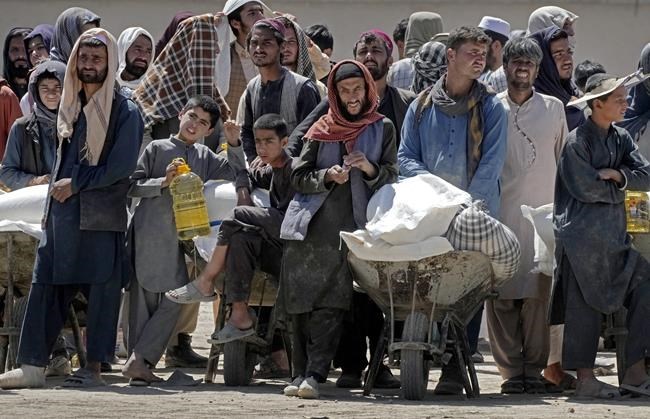OTTAWA — Parliament would need to amend the Criminal Code to allow Canadian aid workers to help in Afghanistan, federal officials told a Senate committee studying the issue.
"Without addressing these blockages in the Criminal Code, there is no way for us to untie the hands that are now providing some of this humanitarian assistance from being done," Marie-Louise Hannan, a director general for South Asia at Global Affairs Canada, told the Senate human rights committee Monday evening.
Humanitarian groups say Global Affairs Canada has told them that purchasing goods in Afghanistan or hiring locals would involve paying taxes to the Taliban, which might be considered as contributions to a terror group.
That advice was given despite a cascade of humanitarian crises in Afghanistan, from a collapsing health-care system to soaring rates of child malnutrition.
A House of Commons committee flagged the issue in June, noting that other Western countries amended their laws or issued exemptions for aid groups as early as fall 2021.
Hannan said bureaucrats across three departments are well aware of the issue.
"For the last year, we have been mandated to look at this question, and have been trying to come up with the most expedient way to address it," she said.
A Department of Justice official said Canada's outdated legislation does not have the flexibility that allowed the United Kingdom and Australia to carve out exemptions from their laws.
"From a technical sense, the legislation at issue here was passed in 2001; it hasn't been substantially amended since then," said senior criminal-law counsel Robert Brookfield.
Constitutional lawyers have argued the existing laws are contradictory and would not have aid workers sent to prison, and would likely violate the charter.
But the officials told the committee that a judge would need to rule on that, most likely after an aid worker is charged with a criminal offence. Brookfield said that's because police, prosecutors and courts act independently from government, which can amend laws through Parliament but not bend how they are applied.
"The Canadian government doesn't have the authority to reinterpret the legislation as it sees fit," Brookfield said.
He also pushed back on arguments from lawyers that the Taliban cannot be deemed a terror group if they are the government of Afghanistan. Brookfield noted that the Hamas and Hezbollah political parties have governed certain areas while still having parts of those organizations deemed to be terror groups.
Sébastien Aubertin-Giguère, an acting assistant deputy minister for the Department of Public Safety, said the problem has to be handled delicately.
"We need to balance the humanitarian need, versus the integrity of the terrorist-financing provisions of the (Criminal) Code," he said.
Aubertin-Giguère also could not say whether the government will take any action before the House of Commons rises for its scheduled six-week holiday break.
"I'm not in a position to provide a timeline at this point," he said. "It's a complex issue and it's important to remember we're dealing with serious terrorist financing provisions."
The officials testified Monday evening after cabinet ministers declined to appear.
Public Safety Minister Marco Mendicino, Justice Minister David Lametti and International Development Minister Harjit Sajjan, as well as their parliamentary secretaries, all said they had prior plans on the evenings of Dec. 5 and 12.
Canadian aid groups working in Afghanistan told the committee about growing desperation in the country that is driving some locals to join terrorist groups.
Ottawa has boosted aid delivered through United Nations organizations, but World Vision Canada policy head Martin Fischer noted that this help cannot be delivered through Canadian groups.
His colleagues had to drop tools when the Taliban took over 15 months ago, after years of building relationships and contacts in the country. As a result, World Vision Canada has held back on a push for Canadians to donate.
"Afghanistan is one of the few places that when we launch appeals, there is a tremendous outpouring of solidarity and compassion," Fischer testified.
"Not being able to do that, as the situation increasingly deteriorates, is not just frustrating, it's heartbreaking."
Asma Faizi, head of the Afghan Women's Organization, runs an orphanage in Kabul but has stopped paying rent out of fear she'd be prosecuted for a terrorism offence.
"The landlord is a generous person, who could throw us on the street," she told the committee.
"I don't see any reasons (that) could justify the starvation of the children, and at this moment they are freezing to death without shelter."
The United Nations has raised the alarm as a harsh winter sets in, with millions of people lacking access to adequate food or water.
The UN categorizes half of the Afghanistan's population as being at a crisis level of food insecurity, including six million people formally at risk of famine.
This report by The Canadian Press was first published Dec. 6, 2022.
Dylan Robertson, The Canadian Press



